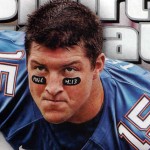Each week in The Holy Huddle, Doug Hankins takes a look at the goings on of the sports world from a distinctly Christian perspective.
Last week, the NBA handed out the Executive of the Year award, not to MBA-types like Jerry Colangelo and Gar Forman. This year’s winner was Larry Joe Bird—as in Basketball Jesus, 12-time All Star, 3-time NBA Champion, Dream Team Member, and 1981 Rookie of the Year. With this award, Bird has become the only person to win the NBA’s Rookie of the Year, MVP, Coach of the Year, and Executive of the Year, which is an unparalleled designation in major professional sports. It is also the culmination of hard work and leadership. I believe, Christians, especially elders, have a lot to learn from Mr. Bird’s example.
Consider these staggering NBA career numbers (per game):
- Larry Bird: 24 points, 6 assists, 10 rebounds, 1.7 steals, .8 blocks
- NBA Player Average (since 1946): 10 points, 2 assists, 5 rebounds, .8 steals, .5 blocks
Based on these stats, Bird produced at the level of two players. Thus, his teams played the equivalent of 6-on-5, which explains why Bird possesses 3 of the 57 MVP trophies and 3 of the 62 NBA Championships. The NBA named him as a top-50 player of all time, Yahoo Sports named him the greatest small forward of all time, Grantland.com editor-in-chief Bill Simmons ranks Bird as the fifth best player of all time, and the Olympic Committee selected Bird to the 1992 Basketball “Dream Team,” arguably the greatest collection of basketball talent ever assembled.
Keep in mind that these are professional accolades. Michael Wilbon argued that Larry Bird’s dual with Magic Johnson in the 1979 NCAA National Championship was the event that helped launch the March Madness craze. In a time when college basketball was rarely televised, Larry Bird’s national championship game drew 20 million TV viewers.
During his first year as a coach, Bird led the Indiana Pacers to a 54-win season (best in franchise). In the playoffs, that Pacers squad fought to a 7-game Eastern Conference Finals series against Michael Jordan’s Bulls. Next season’s squad lost in the Eastern Conference Finals and in the NBA finals against the Lakers in 2000.
When Bird took a job with the Pacers front office in 2003, the Pacers were off to their best start in franchise history. Then The Malice in the Palace happened, forcing Bird to to trade away his best players. Since that time, he slowly and steadily rebuilt the team toward consecutive playoff appearances in 2011 and 2012.
So, what is it about Bird that afforded him such success? A quote from the 1988 All Star game provides insight. When coach Mike Fratello was asked to talk about his winning team, which consisted of Bird (6 points), Jordan (MVP, 40 points), and Dominique Wilkins (29 points), he made this observation:
Michael played well, Dominique played well, but the thing that really impressed me was the way Larry Bird subjugated himself. Larry Bird showed me more today that most people could have possibly noticed. From the standpoint of a coach, you’ve got to love seeing a man do all that he did—come up with a couple of key steals, get back on defense continually, and break up about five fast-break opportunities. To me, he was like an overseer of the game. He saw what we needed, and he acted accordingly.
Jordan has dedication, but to date has not been a great basketball executive. Magic Johnson has discernment, but was not a good basketball coach. Bird is an overseer—he sees what needs to be done and acts accordingly. I believe that leaders in the local Church could learn three things from Larry Legend:
- Develop a range of skills. I fear that too many seminary students and contemporary pastors are enamored with the idea of specialization. I believe that pastors would do well to adopt Bird’s mindset of “whatever it takes,” whether in the areas of public speaking, small group leadership, Bible study, bathroom cleaning, babysitting, or team management.
- Learn to lead in the good and the bad. Although a winner, Bird also lost some games. He had a degenerative back condition. He coached teams without superstars. Yet, he kept leading. Elders should take the same approach.
- Overacheive. Bird appears to live by the mantra: “Under-promise and over-deliver,” which is a nice balance of humility and excellence. Over-acheivers don’t get scared at small budgets, lack of trained leaders, or quirky churches. The Lord leads them to overachieve with what they have.











